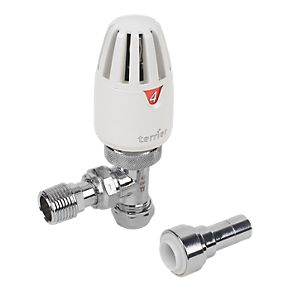
Thermostatic Radiator Valves (TRVs) are often fitted to radiators to give a more responsive control of the radiator heat output according to the air temperature in the room. The head of the TRV has a sensor which responds to the air temperature around it. When the sensor expands on warming it pushes against a pin which closes the valve.
Thermostatic Radiator Valves (TRVs) frequently stick in the shut position, resulting in radiators remaining cold. They are likely to stick if left turned off for long periods.
TRVs should not normally be turned to the off or 0 setting, unless the radiator is being removed. It is usually sufficient to turn them down a little, say to setting 1 or 2.
To free a stuck TRV, first remove the plastic head from the brass body. This is usually done by unscrewing a knurled ring or nut, but some TRVs (e.g. Danfoss, Giacomini) have other fixing methods.
When the head is removed, you will see a small pin projecting from the valve body. Normally this can be pressed in (using a flat side of some tool to apply pressure) against spring pressure. On release it will spring back to its original position.
If the pin does not move, the inner part of the valve (the jumper) is probably stuck shut. To free it, apply pressure to the pin as described above, then release, then apply pressure again. Keep repeating this procedure until the pin starts to move.
You can tap with a hammer to free the pin, but not too hard or you may damage the pin or valve. Do not pull the pin out or water may escape and it may be difficult to refit the pin. In most cases it is not the pin itself that is sticking, but the inner mechanism, so pulling the pin has no effect.
Once some movement occurs a few more applications of pressure will return it to its normal state. Open the head to the highest setting and refit.